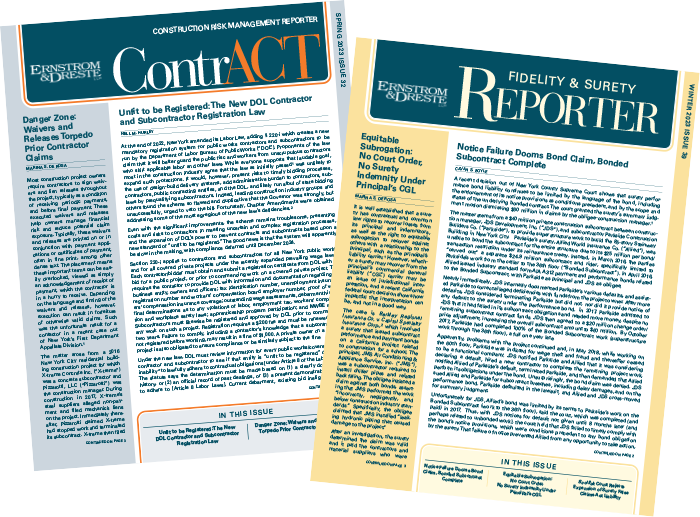Article by: Nell M. Hurley
An interesting case out of a North Carolina federal district court shows that the execution of a general agreement of indemnity by a person who lacked authority to bind the principal/indemnitor does not necessarily prevent its enforcement. The court ordered the defaulted principal/indemnitor to deposit collateral, furnish the surety with full access to its books and records, and granted summary judgment on liability to the surety for the indemnitor’s contractual obligation to exonerate and indemnify the surety for all loss under the agreement.1
The relationship started in the usual manner in 2018, with the underwriting, approval, and extension of bonding by the surety to the indemnitor/principal (“Principal”). The Principal, a limited liability company, was comprised of two trusts, each holding a fifty percent ownership. Each trust had a sole trustee, and those two individuals were the co-managers of the Principal. An industry standard indemnity agreement was executed electronically on behalf of the Principal by the sister of the two co-managers, signing the name of one of them. Neither co-manager executed, reviewed or received a link for signature to the indemnity agreement at the time of its execution by the sister.
Despite this, the issue of the validity of the indemnity agreement did not come to light until a few years later, deep into numerous defaulted projects, significant payments by the surety for bonded obligations, surety extension of financing to the Principal, ignored demands for collateral and access to books and records and, finally, the surety’s motion for a preliminary injunction for performance on and breach of the indemnity agreement.
At that point, the Principal asserted that the indemnity agreement was invalid and unenforceable since it had not been signed by both co-managers, as required by the Principal’s operating agreement (which was allegedly provided to the surety during underwriting), and therefore lacked mutual assent. In analyzing the issue, the court was guided by North Carolina case law that a principal is bound to contracts made by its agents in three situations:
1. When the agent acts within the scope of his or her actual authority;
2. When the agent acts within the scope of his or her apparent authority, and the third person is without notice that the agent is exceeding actual authority; and
3. When a contract, although unauthorized, has been ratified by the principal.
Concluding that the sister lacked actual authority to execute the indemnity agreement, the court looked to facts regarding the sister’s apparent authority, notice to the surety of exceeding actual authority, and whether the principal had ratified the agreement by its conduct. In finding in the surety’s favor on each of these issues, the court cited the following:
1. The Principal regularly held the sister out to others as a manager and as having authority to bind the Principal to contracts, including: naming her as corporate secretary and the only company official in its LLC annual report, her signature on Letters of Intent, her execution of bonds on behalf of the Principal listing her title as “manager,” sometimes doing so in front of the Principal’s co-managers.
2. The Principal’s co-managers had full knowledge of the indemnity agreement executed by the sister, yet never disaffirmed it, or questioned its execution, until filing its opposition to the surety’s motion for preliminary injunction.
3. The Principal received the benefit of over $54 million in bonding over 3 years, allowing it to secure and perform numerous construction contracts.
Thus, decided the court, even if the alleged provision of the Principal’s operating agreement (which the surety disputed) was a “notice” of limitation on the sister’s actual authority, the Principal clearly received the benefit of the indemnity agreement, and thus ratified its execution despite the technical defect. In addition to granting the surety summary judgment on liability for breach of the indemnity agreement, along with specific performance for collateral deposit and books and records access, the court dismissed the Principal’s counterclaims for unfair and deceptive trade practices, tortious interference with contract, and defamation.
While certainly a just result for the surety in this instance, the case highlights that best practices for the surety should include methods for identification and confirmation of the individuals with actual authority to execute the indemnity agreement and other documents binding on the corporate principal.
- Frankenmuth Mut. Ins. Co. v. Nat’l Bridge Builders, LLC, 2023 WL 5340919 (W.D.N.C. Aug.18, 2023).




